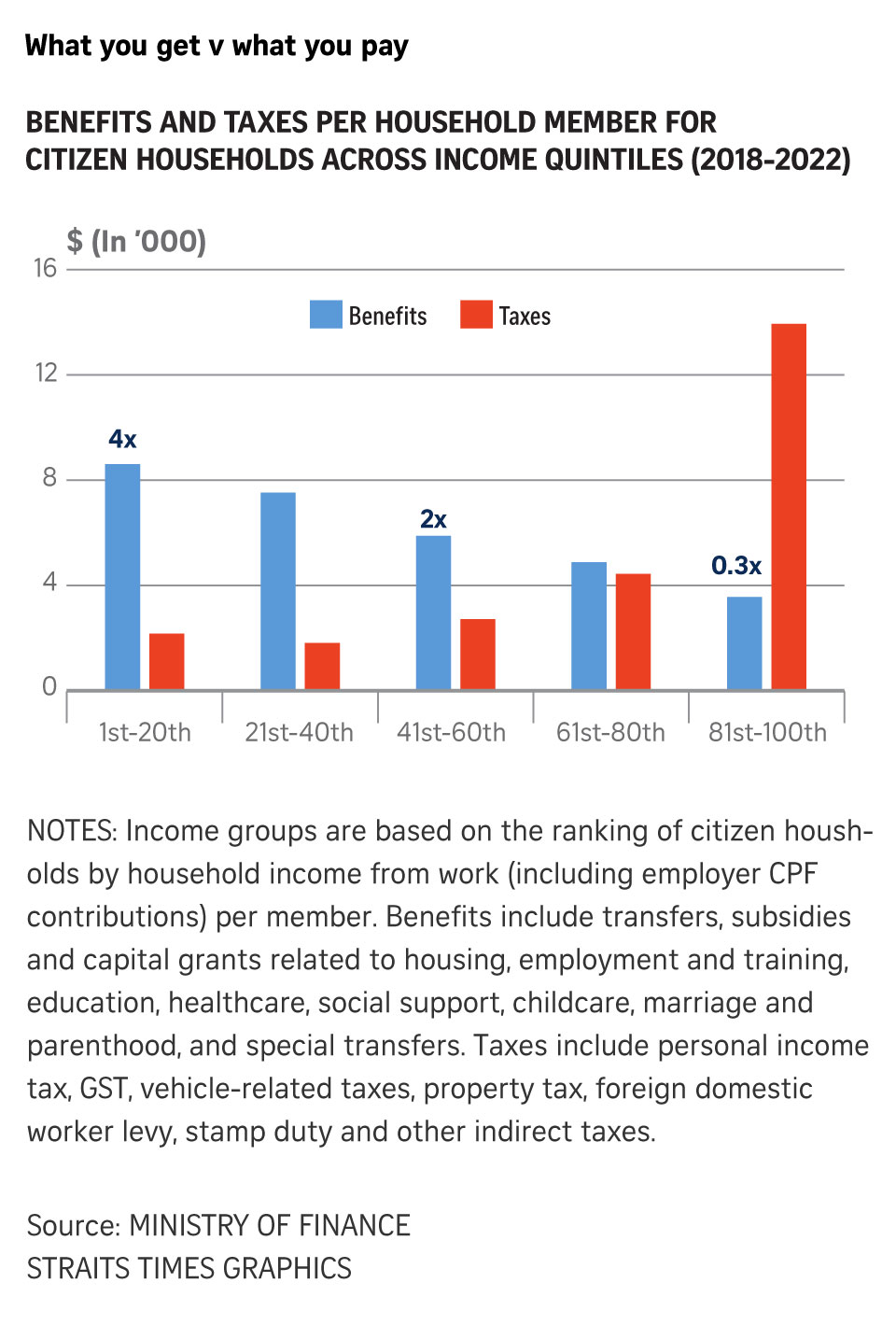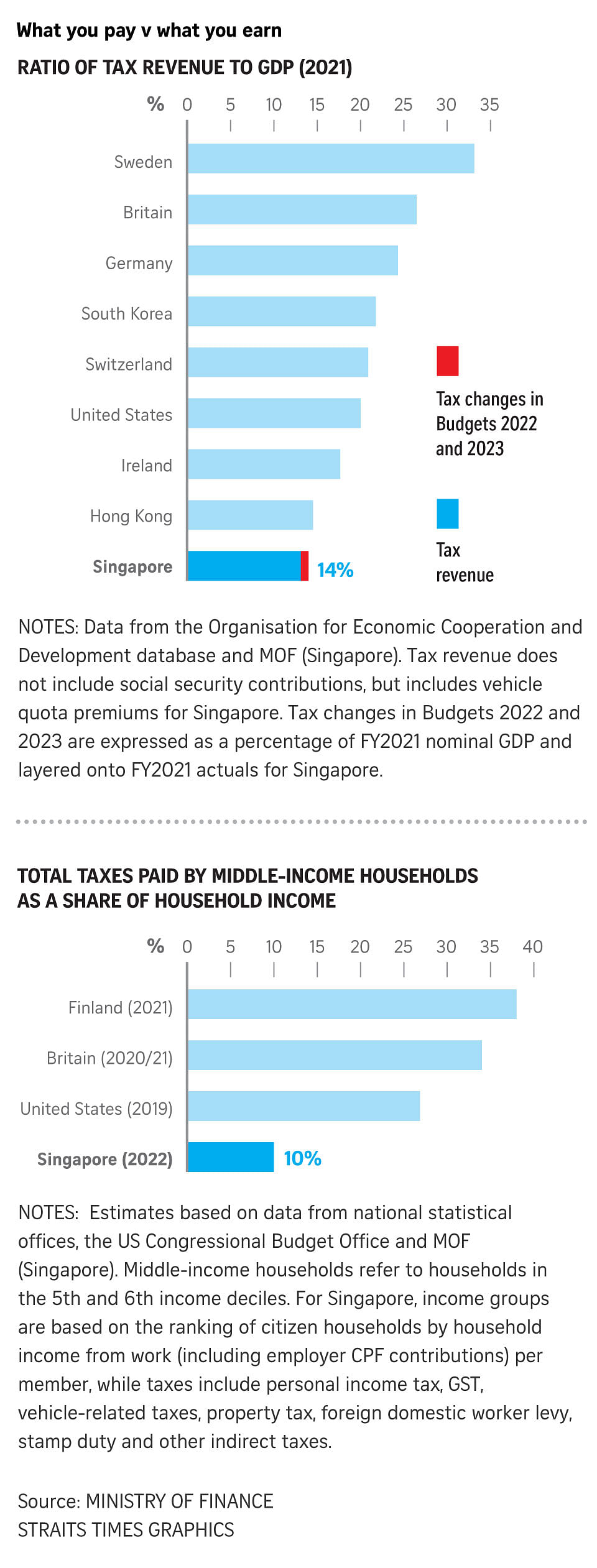SINGAPORE - Compared with citizens elsewhere, Singaporeans pay much less in taxes and yet are able to enjoy high-quality public services, Deputy Prime Minister and Finance Minister Lawrence Wong said on Friday, as he debunked claims that middle-income Singaporeans are overtaxed.
The impact of the Budget on the middle-income had come up during the Budget debate, with MPs from both sides of the aisle asking for more help for the sandwiched class, who have to care for both young children and elderly parents.
In response, Mr Wong cited figures to show that for households in the middle quintile, taking into account their total taxes paid – not just personal income tax, but other indirect taxes as well – the effective tax burden is around 10 per cent of income.
Compared with other advanced economies – using estimates for the United States, United Kingdom and Finland based on publicly available data – the Republic’s tax burden is significantly lower than that of these countries, said Mr Wong.
During the Budget debate on Wednesday, Progress Singapore Party Non-Constituency MP Leong Mun Wai said that middle-class Singaporeans are overtaxed relative to their income, as they pay a wide range of indirect taxes, such as the goods and services tax (GST) and the certificate of entitlement.
“I think the facts and figures speak for themselves,” said Mr Wong. “What Mr Leong said is an outright falsehood.”
Among advanced economies, Singapore is also one of the few economies in which people in the middle have enjoyed significant increases in real incomes in the last 20 years, said Mr Wong.
Median household real income growth here over the last decade was 3.2 per cent per annum, higher than that in the US and most other European societies, and also above that in other Asian societies like Japan and Hong Kong.
“So, we will continue to do everything we can to help our broad middle raise their standards of living, and support them in meeting their aspirations,” Mr Wong said.
He stressed that one should not just look at the individual schemes and changes, but also focus on the overall taxes and benefits for the middle-income.
Here again, he pointed out, it is clear that the middle-income overall still receive more in benefits than the taxes they pay.
In particular, for the middle 20 per cent, the amount of benefits they received was about twice the amount they paid in taxes.
This compares favourably with other jurisdictions like the UK and Finland, where the middle quintile received around $1.25 of benefits for every dollar of tax they paid, compared with Singapore’s ratio of two to one.

Even the upper-middle-income groups, or those in the 61st to 80th percentile, received about the same or slightly more in benefits compared with what they paid in taxes.
“They may not get as much in direct cash benefits compared to the lower-income groups, but they enjoy access to affordable housing, healthcare and world-class education,” said Mr Wong.
He added that the overall tax burden on Singaporeans, at 14 per cent of gross domestic product, is also lower than in most other advanced economies, and this is after factoring in the tax changes in this year and last year’s Budgets, including the full GST increase.
“In other words, compared to citizens elsewhere, Singaporeans pay much less in taxes and yet are able to enjoy high-quality public services. At the same time, this low tax burden rewards hard work and enterprise, and allows our people and businesses to keep most of what they earn,” he said.

https://www.straitstimes.com/singap...-are-overtaxed-an-outright-falsehood-dpm-wong
The impact of the Budget on the middle-income had come up during the Budget debate, with MPs from both sides of the aisle asking for more help for the sandwiched class, who have to care for both young children and elderly parents.
In response, Mr Wong cited figures to show that for households in the middle quintile, taking into account their total taxes paid – not just personal income tax, but other indirect taxes as well – the effective tax burden is around 10 per cent of income.
Compared with other advanced economies – using estimates for the United States, United Kingdom and Finland based on publicly available data – the Republic’s tax burden is significantly lower than that of these countries, said Mr Wong.
During the Budget debate on Wednesday, Progress Singapore Party Non-Constituency MP Leong Mun Wai said that middle-class Singaporeans are overtaxed relative to their income, as they pay a wide range of indirect taxes, such as the goods and services tax (GST) and the certificate of entitlement.
“I think the facts and figures speak for themselves,” said Mr Wong. “What Mr Leong said is an outright falsehood.”
Among advanced economies, Singapore is also one of the few economies in which people in the middle have enjoyed significant increases in real incomes in the last 20 years, said Mr Wong.
Median household real income growth here over the last decade was 3.2 per cent per annum, higher than that in the US and most other European societies, and also above that in other Asian societies like Japan and Hong Kong.
“So, we will continue to do everything we can to help our broad middle raise their standards of living, and support them in meeting their aspirations,” Mr Wong said.
He stressed that one should not just look at the individual schemes and changes, but also focus on the overall taxes and benefits for the middle-income.
Here again, he pointed out, it is clear that the middle-income overall still receive more in benefits than the taxes they pay.
In particular, for the middle 20 per cent, the amount of benefits they received was about twice the amount they paid in taxes.
This compares favourably with other jurisdictions like the UK and Finland, where the middle quintile received around $1.25 of benefits for every dollar of tax they paid, compared with Singapore’s ratio of two to one.

Even the upper-middle-income groups, or those in the 61st to 80th percentile, received about the same or slightly more in benefits compared with what they paid in taxes.
“They may not get as much in direct cash benefits compared to the lower-income groups, but they enjoy access to affordable housing, healthcare and world-class education,” said Mr Wong.
He added that the overall tax burden on Singaporeans, at 14 per cent of gross domestic product, is also lower than in most other advanced economies, and this is after factoring in the tax changes in this year and last year’s Budgets, including the full GST increase.
“In other words, compared to citizens elsewhere, Singaporeans pay much less in taxes and yet are able to enjoy high-quality public services. At the same time, this low tax burden rewards hard work and enterprise, and allows our people and businesses to keep most of what they earn,” he said.

https://www.straitstimes.com/singap...-are-overtaxed-an-outright-falsehood-dpm-wong

